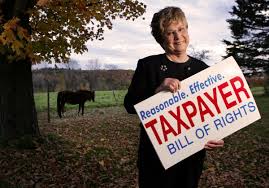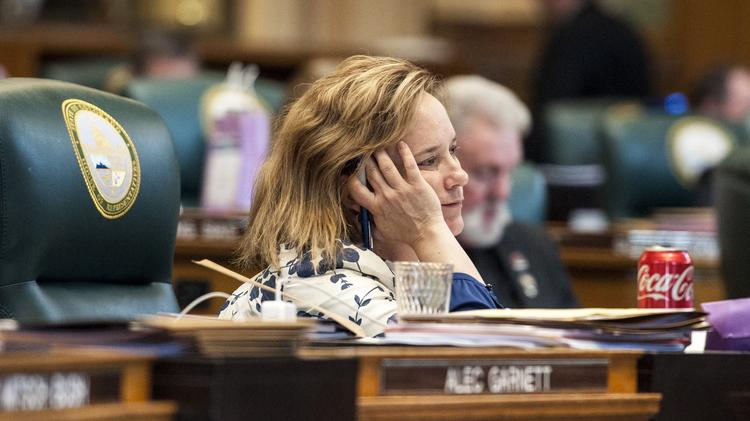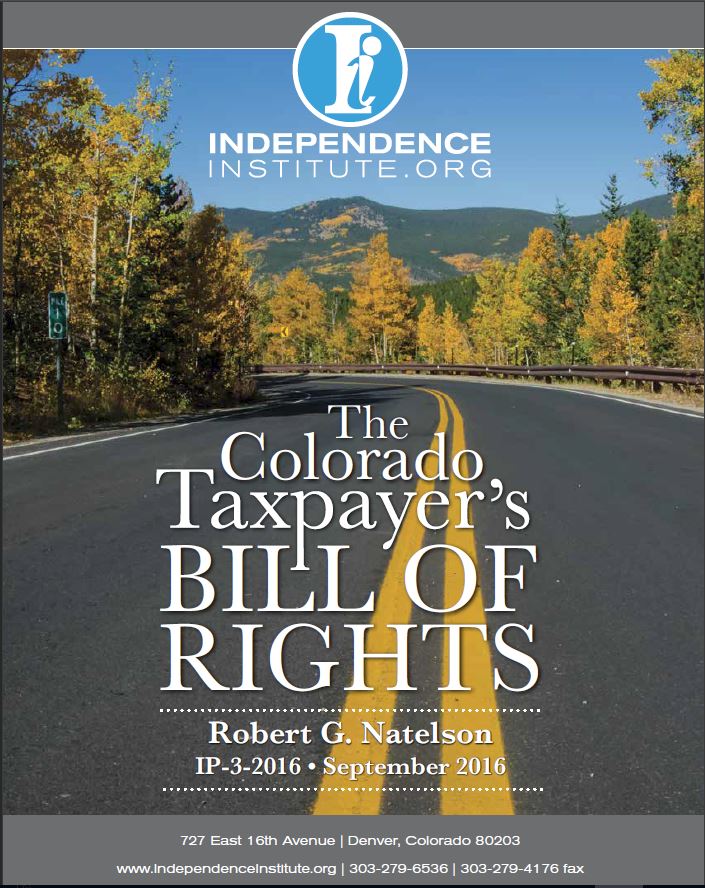Category Archives: Colorado Legislature
Response To Governor’s Office Tweet About Colorado’s Economy
Legislature dismantles Colorado Energy Office, passes major spending bill on final day
“But the biggest agreement of the day came on SB 267, a bill that attempts to meet several of the most crucial needs in Colorado — increased road funding, stabilized funding for rural hospitals, a boost in funding for rural schools — as it also allows for more spending room in future budgets.
Several House Republicans blasted the bill, which largely was crafted by Republican Sen. Jerry Sonnenberg of Sterling. They said it violated the Taxpayer’s Bills of Rights by not reducing the TABOR spending cap by as much as the cost of the roughly $800 million hospital provider fee program that it took out from under the cap and made into an enterprise.
Rep. Tim Leonard, R-Evergreen, said it also violated the legislative requirement to limit all bills to a single subject, even as it seemed to try to fill the needs of many sectors to grow their government funding.
“We work for the people,” Leonard told House members. “We do not work for the recipients of government money waiting for the trough to fill up with taxpayer money.”
But a number of other Republicans, who largely represent rural areas or are considered more moderate members of their caucus, said they backed the measure because the spending recipients needed the boost. They echoed arguments from the Colorado Hospital Association that between six and 12 rural hospitals could close if they lost the money originally projected to be taken from them in order to balance the budget next year.
And several blasted conservative organizations who have criticized them for going along with the plan, saying they are out of touch with constituents’ needs and are making the Legislature a place that is run by fear.
“I know by the time I get back to my desk, the Facebook posts will start. We’ve heard them already: ‘Squish, RINO,’” said Rep. Lois Landgraf, R-Fountain, referring to the acronym some groups give to elected officials they consider to be Republican In Name Only.
“What’s not OK is that by the time I walk out of here, I will have earned myself a primary. But I am happy to be a ‘yes’ vote.”“
Over the course of a turbulent 13-hour final day of the 2017 session Wednesday, the Colorado Legislature passed one the most wide-ranging omnibus spending bills in recent memory and then killed off the vast majority of functions of the Colorado Energy Office.
The 120th day of the first session of the 71st General Assembly began with broad bipartisan support over Senate Bill 267, a measure that saves Colorado hospitals from $528 million in funding cuts, dedicates $1.88 billion to highway projects, pares Medicaid spending and offers a personal property tax credit to businesses for their first $18,000 worth of business equipment.
– LEGISLATURE’S LAST DAY: Click above for Kathleen Lavine’s look at the session’s conclusion.
Despite protests from some Republicans that some of its spending maneuvers were unconstitutional, nearly half of the caucus joined with House Democrats in passing the bill by a 49-16 margin and sending it onto Gov. John Hickenlooper.
But that was about the only kumbaya moment of a day that descended into endless negotiations and then finger-pointing over two issues key to businesses in rural Colorado.
By the time the state House of Representatives adjourned at 9:39 p.m., the Legislature had rolled back a bill to increase funding for rural broadband.
No gas for Energy Office
They also had failed to pass a reauthorization bill for the Colorado Energy Office, meaning that the majority of the office’s functions and its 24-person staff will disappear July 1. Continue reading
What you need to know about the bill Colorado lawmakers are “screaming” about behind closed doors
What you need to know about the bill Colorado lawmakers are “screaming” about behind closed doors
The latest proposal includes a larger co-pay for Medicaid patients, $1.8 billion for state road repairs

Colorado State Capitol building
The final stretch of the Colorado legislative session is becoming a must-watch political theater — with huge stakes.
Republican and Democratic leaders are negotiating behind closed doors on a far-reaching spending overhaul designed to erase a half-billion-dollar financial hit to hospitals
Senate President Pro Tem Jerry Sonnenberg, a Republican, unveiled early Monday what he believed was an agreement on the legislationonly to receive a note moments later from Democrats calling off the deal.
Do You Raise Taxes Or Cut Spending?
Why Politicians Oppose TABOR
The Colorado Taxpayer’s Bill Of Rights Booklet
Douglas Bruce’s response to Rural Republicans tell lawmakers it’s time for action on Hospital Provider Fee
Let’s apply ten conservative political principles to this hospital provider fee situation.
- 1. Limiting growth of state government requires setting state spending priorities.
- 2. Allowing any business to fail that has insufficient market demand is called the free market. Government intervention violates the meaning of a free market.
- 3. What does the most good for the most people–propping up failing businesses or providing broad benefits of limited government services equally to everyone?
- 4. Who was forced to live in remote rural areas with fewer services? (No one.)
Rural Republicans tell lawmakers it’s time for action on Hospital Provider Fee
Dire funding news for the state’s hospitals has left Republicans in rural Colorado pleading with the legislature to restructure the Hospital Provider Fee, despite ideological beliefs.
It is a thorny issue that pits conservatives in the legislature against fellow Republicans in rural parts of the state.
Hospitals face a $264 million reduction in the upcoming budget that begins in July. That number is up from an initial budget request in November, which proposed a $195-million reduction. Rural hospitals are expected to receive the worst of it, with expectations for some hospitals to close.
Budget writers have proposed a $28.3 billion annual spending plan that lawmakers will begin to debate this week. In an effort to pass a balanced budget, the Joint Budget Committee proposed reducing collections of the Hospital Provider Fee.
TABOR bill sponsor responds to constituents and bows out; says he will vote against changes
DENVER – One of three Republican sponsors on a bill that would change the way revenue is capped under the Taxpayers Bill of Rights (TABOR) has had a change of heart.
Despite the fact supporting TABOR is one of the many issues that normally binds conservatives, Representatives Phil Covarrubias, (R-Adams/Arapahoe), Dan Thurlow (R-Mesa) and Lois Landgraf, (R-El Paso) all originally advocated for a change to the 25-year-old constitutional amendment that restricts tax increases without a vote of the people and caps state revenue.
Covarrubias, however, said he took enough backlash for his role in it that he announced via social media that he was pulling his name from the sponsorship of HB17-1187.
“In case you have not heard: per the request of my constituents, I have decided to take my name off HB 1187 and will be voting against it,” Covarrubias said on his Twitter feed.
The Tweet came as welcome news to many fellow Republicans who immediately retweeted the announcement with words of gratitude.
Senate Bill 1187 would ask voters in November to change the revenue cap from one that is based on percentage increase in state population plus the rate of inflation to one that is based on Colorado personal income growth over a rolling calendar of the previous six years.
The bill passed third and final reading Friday and now moves to the Senate, where Republicans hold a one-vote majority. It is expected to be heavily debated again.
Opponents say the current formula takes into consideration that a larger population requires more government services while proponents argue the current formula is outdated. Continue reading











